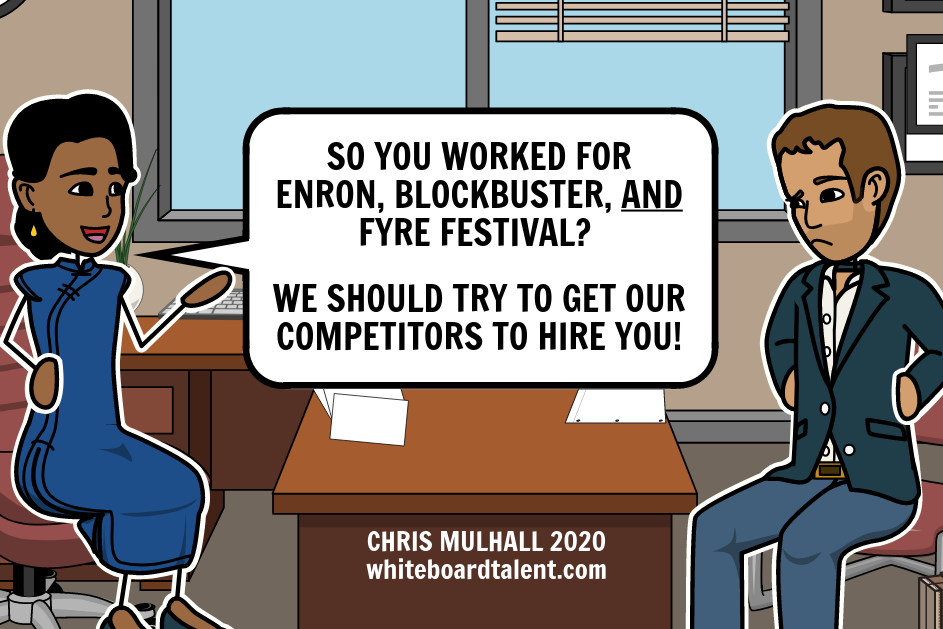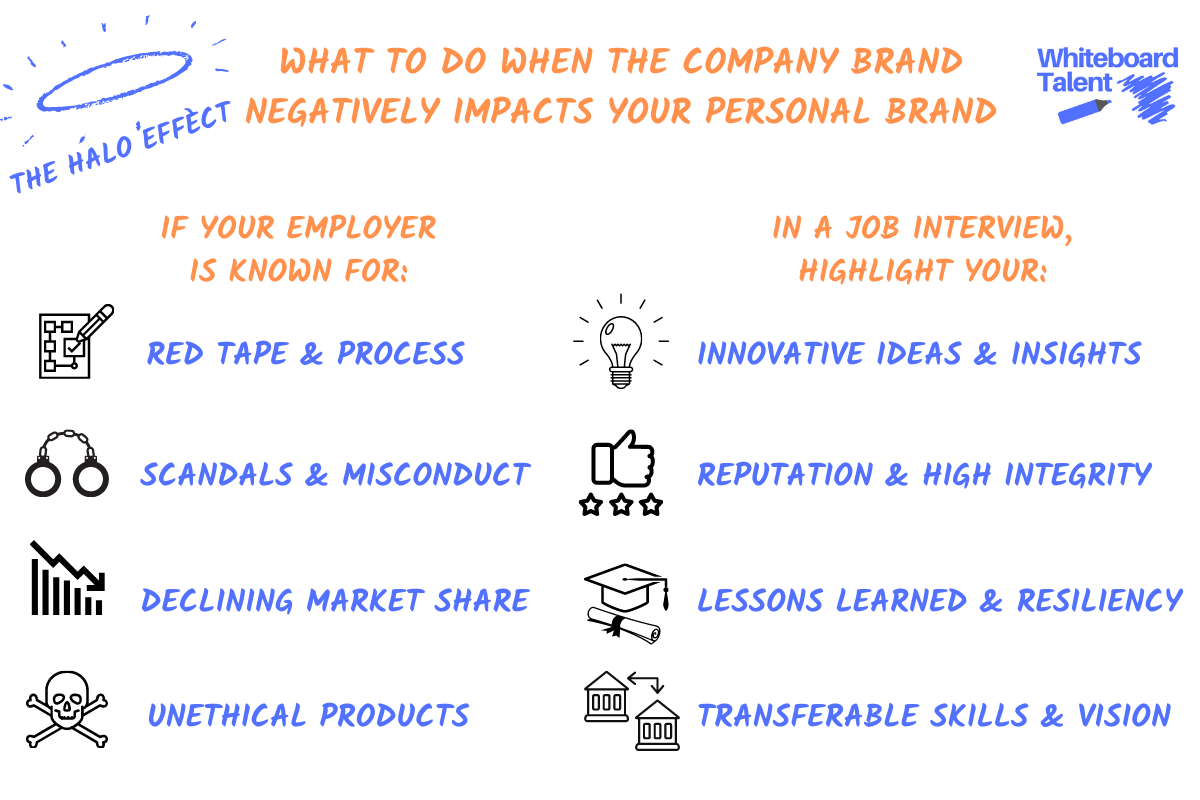The Halo Effect: How Employer Brands Influence Personal Brands
I've noticed a new trend popping up in the headline section of LinkedIn bios.
More and more professionals are branding themselves as Ex-Netflix, Ex-Google, Ex-(Trusted and Respected Brand) employees.
For most professionals with (Ex-brand) in their bio, the theory is that a potential "buyer" (recruiter, hiring manager, prospect, or partner) will infer that the brand reputation you associate with those companies (Apple, Netflix, Google, Nike, etc.) is personified in them. By extension, they too are innovative, driven, and highly successful.
Maybe there's some truth to the premise. Behind every beloved and respected company is a collection of high-impact employees. But when it comes to hiring, we need to evaluate candidates based on their own merits, rather than being swayed by the Halo effect.
And that's what makes the flip side so interesting to me - what if your current or previous employer's reputation is dragging you down with them? You don't see any LinkedIn profiles with ex-Enron, Ex-Blockbuster Video, or ex-Exxon Valdez in the headline.
Even if your tenure with a discredited company appears in the "previous employment" section, it's hard to shake the downstream impacts to your career and earnings potential. Many Enron and Lehman Brothers employees have struggled to return to comparable jobs and salary levels in the post-scandal years. Harvard Business Review describes this scenario as "The Scandal Effect," where former employees struggle to find a new job after a workplace scandal, even if they had nothing to do with the breach of trust. Women are significantly impacted by the Scandal Effect, earning 7% less in subsequent jobs, compared to 3% less for men. The lower wage is attributed to the fact that women are less likely to negotiate on salaries than men, and are even less inclined to press for higher compensation if they believe their personal brands are compromised.
But the Halo effect is not just limited to scandals. A variety of factors can negatively influence employer brands. Over my recruitment career, I've interviewed many candidates that have had their employment dates intertwined with corporate collapses, product recalls, and PR disasters. Those candidates frequently glossed over their tenure for fear that the corporate brand would discredit their reputation.
Here’s the thing - I'm more than just a Recruiter on the receiving end of corporate stereotypes; I'm a member of the club too. Like thousands of my former colleagues, my tenure at BlackBerry overlaps with the same years that are most likely to appear in an MBA case study - the well-documented rise, fall, and transformation of a smartphone giant. Just like the candidates I've interviewed, I've shared my perspective on the corporate adversity that overlapped with my employment dates.
So how do we mitigate the risk of our cognitive bias seeping into the interview process?
An excellent first step is to have Recruiters and Hiring Managers complete formal training to raise awareness of their biases and unsupported generalizations. The learning objective is to assess candidates based on their individual merits, rather than inviting baseless assumptions into the hiring process.
Nevertheless, if your employer or industry has reputational challenges, you're at the mercy of the interviewers and their ability to make rational hiring decisions.
Let's role-play a scenario where you're a Hiring Manager interviewing "Halo effect" candidates. If you drive a Volkswagen, you may react with more angst about falsified emissions tests than you do about accounting fraud. Maybe you look back with fond memories of your first smartphone with a physical keyboard, but you assume that everyone who renews your driver's license lacks urgency and motivation. Different ideologies invoke different generalizations.
And so the challenge becomes: How can you succeed in the interview process if your personal brand is negatively influenced by a company or industry brand? Here are five tips to help you rewrite your brand narrative in the job interview process
1. Highlight Your Integrity:
Fyre Festival was a disaster of a music festival. And while the hubris at the top led to the inevitable downfall, there are heartwarming stories of people like Maryann Rolle, the Fyre Festival caterer. She spent her life savings to cover her employee's paychecks after never receiving payment from the festival organizers. The outpouring of support for Rolle and her crowdfunding campaign's success is a testament to how a personal brand can supersede a negative corporate brand.
A Hiring Manager might ask for your perspective on your employer's scandal, shortfall, or Public Relations disaster. It's important to cite specific examples of how you responded to the crisis by highlighting your ethics, values, and integrity.
2. Showcase Your New Competencies:
Although it's hard to see when immersed in the transformation, my BlackBerry colleagues and I developed our resiliency competencies during those roller coaster years. The key attributes that jump out to me are: courage, dealing with ambiguity, making difficult business decisions, recognizing patterns, and acting with compassion.
I'm still close with many Ex-BlackBerry colleagues, and we share a common sentiment - the skills that we acquired during those challenging years have positively impacted our professional development. Organizational pivots, transformations, and rebirths are inevitable. Regardless of your department, we all have examples of the hard and soft skills we acquired after facing adversity on the job.
3. Provide Examples to Counter Industry Stereotypes:
Innovation and government are two words that rarely appear in the same sentence. And yet, many government divisions are openly embracing the notion of challenging the status quo. Innovation management is not just for patents and product breakthroughs. It's often about bringing creative ideas to fruition, prioritizing investments, facilitating brainstorming sessions, and implementing process improvement ideas.
If your industry is synonymous with bureaucracy or complacency, you can counter the Halo effect by sharing examples of how you've led transformational projects and initiatives from idea to implementation.
4. Focus on Transparency and Honesty:
A handful of bad actors tarnished the lives and careers of thousands of ex-Enron employees. Personal brands became unfairly characterized as ignorant, deceitful, or incompetent. But a Recruiter or Hiring Manager isn't doing their job if they're not conducting due diligence to clarify your awareness or complicity with organizational shortfalls. It's not a personal attack; it's an element of the candidate assessment process.
If asked for your perspective on your employer's negative reputation, it's important to state your involvement or lack thereof, how you responded, and clarify any misleading information. A willingness to be candid in job interviews is a transferable skill that you can apply to other workplace scenarios such as performance feedback discussions, crucial conversations, and learning agility.
Don't be in a hurry to gloss over the topic of adversity. It's a welcome opportunity to reveal your true character.
5. Provide References to Validate Your Credibility:
Kevin Costner is a multiple Oscar winner and legit movie star, but Waterworld nearly sank his career. The film was universally panned by critics, and Costner struggled to reclaim his status as a leading actor and Hollywood A-lister. In Hollywood, just like the corporate world, it helps to have references that will recommend you for your next gig. In Costner's case, his persistence and professional network led him to better roles, including highly acclaimed films such as Tin Cup, Molly's Game, and Hidden Figures.
If asked to provide references for a potential new job, it's key that you select colleagues that will validate the narrative you've shared during the interview process. Ensure that your references are comfortable being transparent about the adversity you faced on the job and how you responded. If your references reaffirm your ethics, values, and accomplishments, you're far more likely to secure the new role.
In Closing:
When you're introspective about the new skills you've developed during periods of adversity, you also gain an impactful story to share with potential employers. Here is Kevin Costner on his brand and reputation after filming Waterworld: "I know that people might think of Waterworld as a low point for me. It wasn't. It could have had a better, more obvious outcome. The thing I know is that I never had to stand taller for a movie when most were going the other way. The movie with all its imperfections was a joy for me…a joy to look back upon and to have participated in."
The Halo effect doesn’t have to derail your career. Whether you're a corporate professional or movie star, everyone loves a good comeback story. If these personal branding tips resonated with you, please subscribe and share. I’m erasing the whiteboard and will share new talent management insights every couple of weeks.


